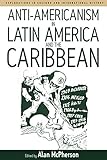Anti-americanism in Latin America and the Caribbean / ed. by Alan McPherson.
Material type: TextSeries: Explorations in Culture and International History ; 3Publisher: New York ; Oxford : Berghahn Books, [2006]Copyright date: ©2006Description: 1 online resource (316 p.)Content type:
TextSeries: Explorations in Culture and International History ; 3Publisher: New York ; Oxford : Berghahn Books, [2006]Copyright date: ©2006Description: 1 online resource (316 p.)Content type: - 9781845451424
- 9780857456953
- 303.48/23073 23
- F1418 .A58 2008
- online - DeGruyter
| Item type | Current library | Call number | URL | Status | Notes | Barcode | |
|---|---|---|---|---|---|---|---|
 eBook
eBook
|
Biblioteca "Angelicum" Pont. Univ. S.Tommaso d'Aquino Nuvola online | online - DeGruyter (Browse shelf(Opens below)) | Online access | Not for loan (Accesso limitato) | Accesso per gli utenti autorizzati / Access for authorized users | (dgr)9780857456953 |
Frontmatter -- CONTENTS -- List of Abbreviations -- List of Illustrations -- List of Tables -- Introduction. Antiyanquismo: Nascent Scholarship, Ancient Sentiments -- Part I: National Narratives -- Chapter 1 Redefining Intervention: Mexico’s Contribution to Anti-Americanism -- Chapter 2 “Bradenism” and Beyond: Argentine Anti-Americanism, 1945–1953 -- Chapter 3 Patriotism and Petroleum: Anti-Americanism in Venezuela from Gómez to Chávez -- Chapter 4 The Making of an Economic Anti-American: Eduardo Frei and Chile during the 1960s -- Chapter 5 Battle for the Heart of the Heavyweight: Anti-Americanism in Brazil -- Part II: Comparative and Transnational Approaches -- Chapter 6 Diaspora against Empire: Apprehension, Expectation, and West Indian Anti-Americanism, 1937–1945 -- Chapter 7 Contrasting Hostilities of Dependent Societies: Panama and Cuba versus the United States -- Chapter 8 Option for the Poor: Liberation Theology and Anti-Americanization -- Part III: Explaining the Absence of Anti-Americanism -- Chapter 9 The United States, Colombia, and Drug Policy, 1984–2004: A Study of Quiet Anti-Americanism -- Conclusion. Common Findings and New Directions -- List of Contributors -- Index
restricted access online access with authorization star
http://purl.org/coar/access_right/c_16ec
Whether rising up from fiery leaders such as Venezuela’s Hugo Chavez and Cuba’s Fidel Castro or from angry masses of Brazilian workers and Mexican peasants, anti U.S. sentiment in Latin America and the Caribbean today is arguably stronger than ever. It is also a threat to U.S. leadership in the hemisphere and the world. Where has this resentment come from? Has it arisen naturally from imperialism and globalization, from economic and social frustrations? Has it served opportunistic politicians? Does Latin America have its own style of anti Americanism? What about national variations? How does cultural anti Americanism affect politics, and vice versa? What roles have religion, literature, or cartoons played in whipping up sentiment against ‘el yanqui’? Finally, how has the United States reacted to all this? This book brings leaders in the field of U.S. Latin American relations together with the most promising young scholars to shed historical light on the present implications of hostility to the United States in Latin America and the Caribbean. In essays that carry the reader from Revolutionary Mexico to Peronist Argentina, from Panama in the nineteenth century to the West Indies’ mid century independence movement, and from Colombian drug runners to liberation theologists, the authors unearth little known campaigns of resistance and probe deeper into episodes we thought we knew well. They argue that, for well over a century, identifying the United States as the enemy has rung true to Latin Americans and has translated into compelling political strategies. Combining history with political and cultural analysis, this collection breaks the mold of traditional diplomatic history by seeing anti Americanism through the eyes of those who expressed it. It makes clear that anti Americanism, far from being a post 9/11 buzzword, is rather a real force that casts a long shadow over U.S. Latin American relations.
Mode of access: Internet via World Wide Web.
In English.
Description based on online resource; title from PDF title page (publisher's Web site, viewed 25. Jun 2024)


